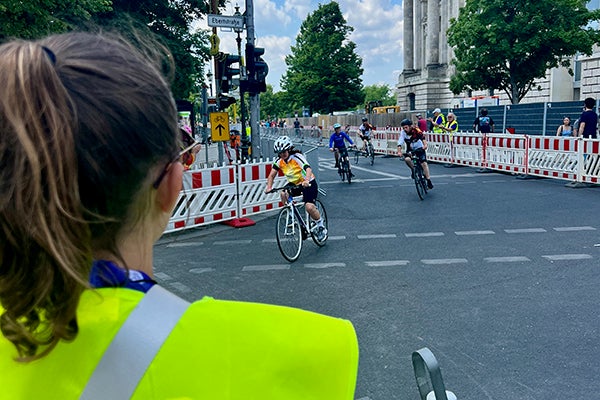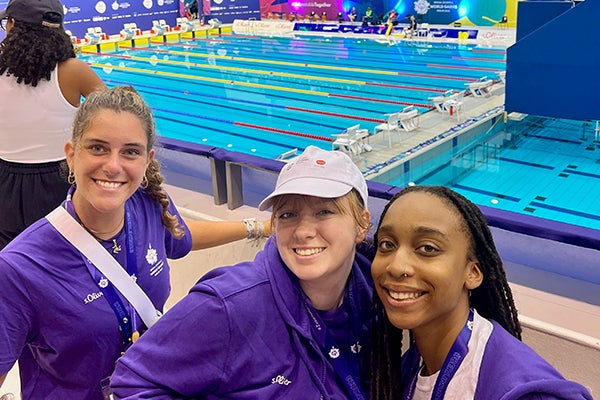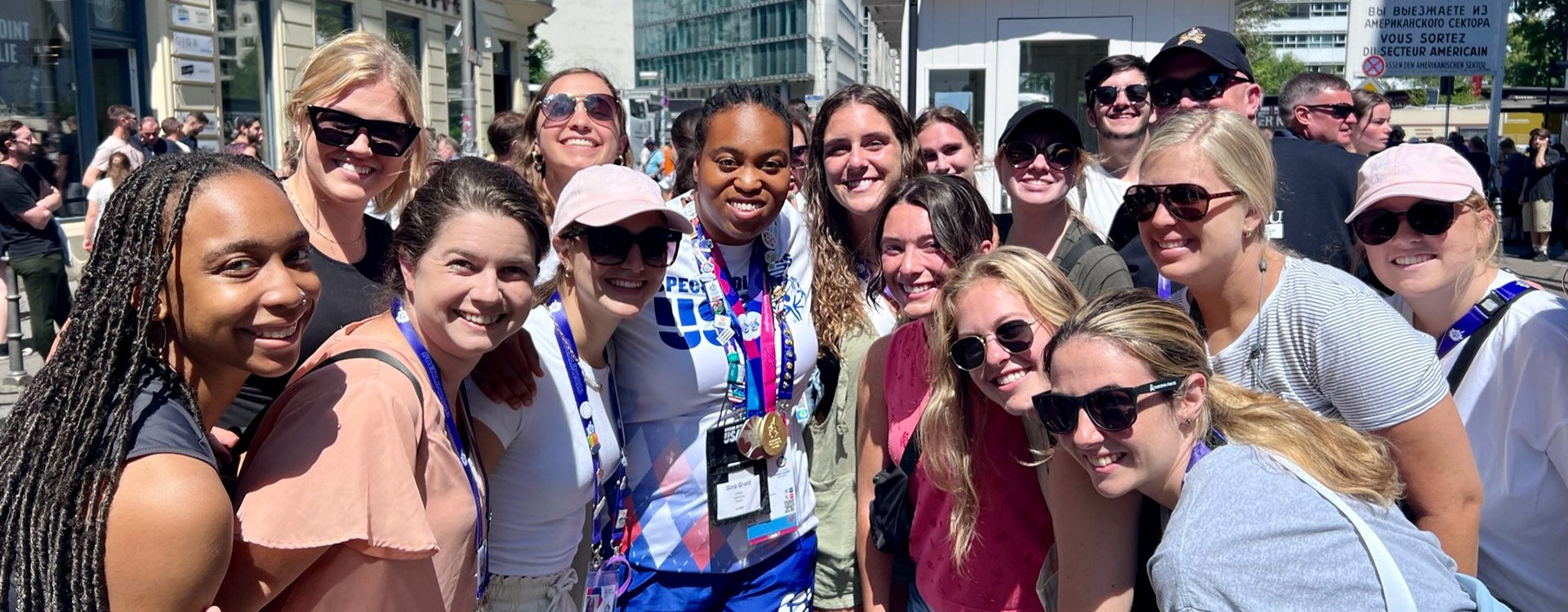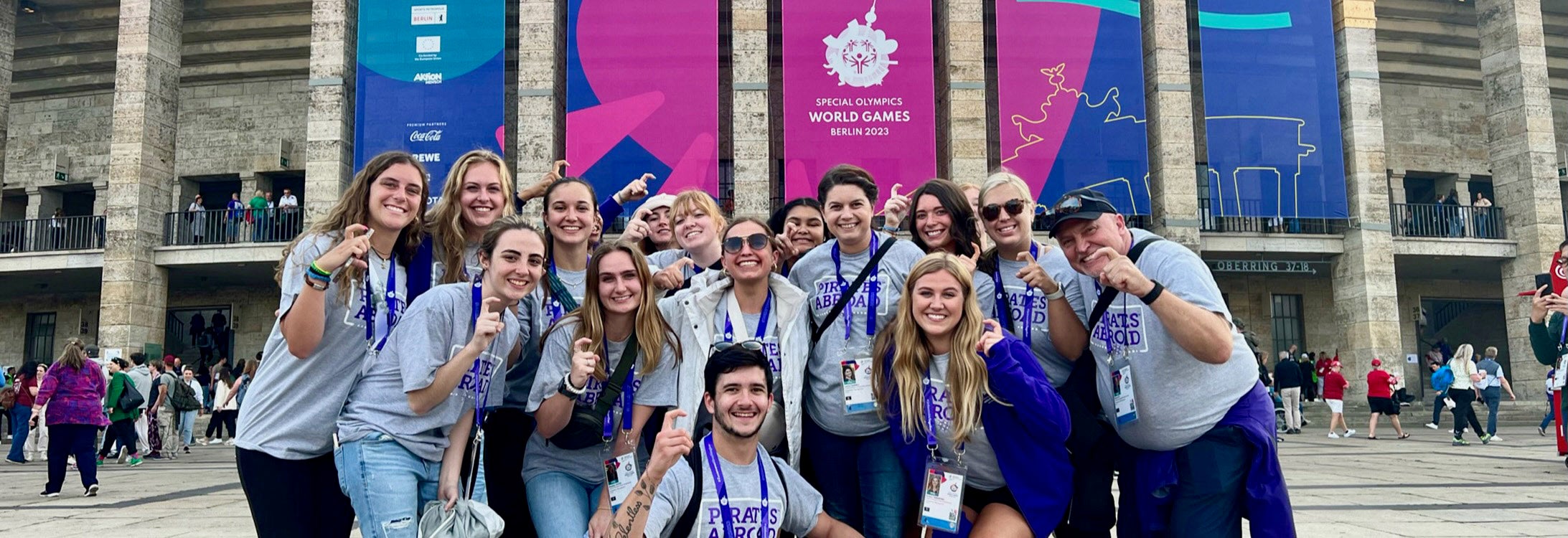FUN INCLUDED
ECU students learn a lot, enjoy volunteering at World Games
Ashanti Cuthrell has a self-described outgoing personality, which was amplified when she volunteered at 3-on-3 basketball competitions at the Special Olympics World Games in Berlin.
The role for Cuthrell, a psychology major at East Carolina University, and other volunteers focused on creating a fun, high-energy atmosphere for basketball games. That involved clapping, plenty of smiles and encouragement, and some dancing.
“The athletes ran out and we were there to hype them up and give high-fives and get them excited and ready to play,” Cuthrell said. “To see their smiles, it meant so much. … We were dancing on the sideline and got the crowd going and went out on the court three or four different times. It was fun. The crowd was hyped about it and the athletes loved it.”
Many of the 15 students who went to Berlin are studying recreation sciences in the College of Health and Human Performance. Recreational therapy associate professor David Loy served as the faculty leader.
They were in Germany from June 16-26, covering the entirety of the Special Olympics World Games held June 17-25.
“Every day was different, in a sense that we learned so many different things about sport and inclusion and also how things are treated in a different country,” said Mark Lore, a recreational therapy undergraduate student.
Lore volunteered at numerous cycling events and said he also enjoyed watching open water swimming as a spectator, seeing athletes face some fear and overcome challenges to thrive during high-pressure moments.
Watch this video with closed captions on YouTube. Video by Special Olympics World Games Berlin 2023.
Even working the morning check-in table brought joy to Kristen Tarantino, a graduate student studying recreational therapy. She had a memorable moment with athletes from Kuwait while exchanging commemorative pins.
“I asked one of the athletes about trading pins and his face lit up with joy,” Tarantino said. “It was the most real thing because I didn’t realize how much the pins would mean to the athletes. I let him pick whichever one he wanted, and the smile that came across his face was so amazing. It showed me that he may not get the opportunity to choose a lot of things in his life. … Just knowing that I could provide something that filled him with so much joy was so great.”
Tarantino said her experiential learning opportunities were limited during her undergraduate studies because of the COVID-19 pandemic, which made this trip to Berlin extra special.
“The more I reflect on it, the more I truly am in awe that I was able to get this opportunity,” she said. “Even the language barrier, there were people coming from all over the world. I never thought I would meet people from any of these countries. Yes, we are all different and some disabilities are visible, some are not. Some are more severe and some are not. But seeing we can all have this common ground of sport and inclusion and being part of such a massive event, it was so life-changing.”

ECU’s Katherine Smyth cheers as cyclists compete during the Special Olympics World Games in Berlin.

ECU students, from left, Elaina Pascavage, Riley Springer and Ashanti Cuthrell, are pictured at a swimming venue for the Special Olympics World Games in Berlin.
The event featured 18,000 volunteers and 6,500 athletes from more than 100 countries. Athletes competed in front of enthusiastic crowds, thanks to a total of 100,000 tickets sold for the competitions.
Volunteer support was instrumental to daily organization and coordination, Loy said.
“I’m sure the athletes felt how neat it was to be there,” Loy said. “For me as a volunteer, I was like, ‘Wow,’ everything was so organized from the marketing to all the banners. It felt bigger than what I had anticipated. I was just so excited to see the effects of travel abroad. I’m so happy that ECU does travel abroad, because we had people who had never flown before or been out of North Carolina before. We had people who had never been really with individuals with disabilities, and they have a different perspective now.
“Also, being able to learn the German culture was another thing I loved. After 10 days, we really understood what the German culture was, and it made me really proud that ECU offers this for our students.”
Volunteer T-shirts were purple, which was a natural fit for the ECU representatives.
“There were so many different volunteers there and so many different people you could learn from,” Cuthrell said. “I talked to so many people and we all came for one common thing and that was the athletes. They were so appreciative, and we always were greeted with a smile and a hug or a high-five. That was really impactful, how everyone experienced so much love.”
Outcomes exceeded expectations for many of the volunteers. Students will write reflective papers emphasizing their positive experiences.
“Working hand-in-hand with the athletes or meeting people in passing who were asking about my shirt or credential, then getting to explain why we were there and what we were doing, it was better than anything you could have asked for,” Tarantino said.

Volunteers from ECU smile with an American athlete at the Special Olympics World Games in Berlin.
